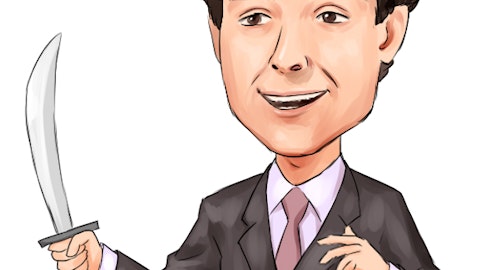Biologic drugmaker Gilead Sciences, Inc. (NASDAQ:GILD) did not escape the selloff that hit the stock market and especially the biotechnology sector, having fallen by 8.8% during the first quarter. The stock had been sliding right up to the point it issued its fourth quarter financial report, which beat market expectations. Revenue came in at $8.51 billion, up by 16% year-over-year, while profit stood at $3.32 per share. Analysts, in turn, were looking for $3.00 per share in earnings on the back of $8.13 billion in revenue. Gilead recently announced a deal to acquire a subsidiary of Nimbus Therapeutics, including an experimental drug that aims to reduce fat buildup in the liver. Gilead will pay an initial $400 million for the unit, with an additional $800 million due if the drug reaches certain milestones in research, approval and sales. The company’s coffers were bolstered with cash generated by sales of its highly lucrative hepatitis C medicines, having reported cash and cash equivalents of $26.2 billion as of the end of 2015. Due to increased competition for hepatitis C drugs and increased pressure from insurance companies, U.S sales have fallen and Gilead has turned its attention towards other experimental drugs it can acquire to add to its pipeline.
When it comes to Gilead Sciences, Inc. (NASDAQ:GILD), hedge fund managers are split: while Cliff Asness had reduced his stake by 17% over the fourth quarter, Samuel Isaly had been buying heavily, having increased his position by 57%. As reported in their respective 13F filings, Asness’ AQR Capital Management held 3.97 million shares of Gilead Sciences, while Isaly’s OrbiMed Advisors had ownership of 3.42 million shares at the end of December.
Follow Gilead Sciences Inc. (NASDAQ:GILD)
Follow Gilead Sciences Inc. (NASDAQ:GILD)
Receive real-time insider trading and news alerts
Israel-based Teva Pharmaceutical Industries Ltd (ADR) (NYSE:TEVA) is another healthcare stock that is very popular among the funds followed by Insider Monkey. During the first quarter the stock fell by roughly 17.9% as part of the overall market decline. The company’s fourth quarter results were not able to prop up the stock, despite the numbers topping analysts’ estimates, but shares have managed to stabilize around the $56 level. Teva Pharmaceutical posted revenue of $4.88 billion and earnings of $1.32 per share for the quarter, beating expectations of $1.29 per share in income and $4.83 billion in revenue. The company recently announced a delay in the takeover of Allergan’s generic drugs unit due to pending regulatory approvals and has said that it now expects the deal to be completed by the end of the second quarter.
Hedge fund sentiment towards Teva Pharmaceutical Industries Ltd (ADR) (NYSE:TEVA) registered a positive boost during the fourth quarter, with the number of long positions reported by elite funds having increased to 81 from 70 during the quarter. Together these 81 funds held roughly 17.5% of the company’s common stock. Andreas Halvorsen’s Viking Global held the largest stake in Teva Pharmaceutical among the funds we track, totaling 25.04 million shares, up by 183% over the fourth quarter. Paulson & Co was not far behind, having indicated ownership of 20.40 million shares in its latest 13F filing, up by 16%.
Follow Teva Pharmaceutical Industries Ltd (NYSE:TEVA)
Follow Teva Pharmaceutical Industries Ltd (NYSE:TEVA)
Receive real-time insider trading and news alerts
The biggest loser of them all is Valeant Pharmaceuticals Intl Inc (NYSE:VRX), down by more than 74% for the quarter. The troubled Canadian drug maker has been plagued by scandals in the past 12 months, forcefully pushing investors to the exits and creating serious problems for staunch investors like Bill Ackman and Jeffrey Ubben, who were heavily exposed to the stock. Mr. Ackman’s Pershing Square held 16.6 million shares of Valeant Pharmaceuticals, down by 16% over the quarter, while Ubben’s ValueAct Capital reported ownership of approximately 15 million shares in its latest 13F filing.
Valeant Pharmaceuticals Intl Inc (NYSE:VRX) took a nosedive at the end of February when the company said it was under investigation by the Securities and Exchange Commission. The stock then fell by 51% on March 15 after the company announced the departure of its CEO, Mike Pearson. These developments were just catalysts for the decline of the stock, with fears that the company’s business model is unsustainable being the main reason for the plunge. Valeant’s troubles started when reports emerged that it was using a number of specialty retailers to promote the sale of high-priced drugs and prevent patients and insurers from switching to cheaper alternatives.
Disclosure: None





